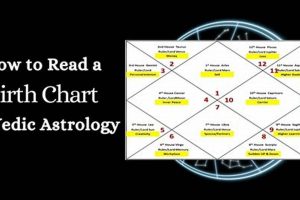Predictions based on the ancient Indian system of astrology, Jyotish, are often offered on a weekly cadence. These forecasts typically incorporate planetary transits and their influence on the twelve zodiac signs. For example, a weekly overview might explain how Mars’s movement through a particular sign could affect career prospects or relationships for individuals born under different signs.
Regular astrological guidance can provide a framework for navigating potential challenges and opportunities. Rooted in a rich tradition, this practice offers insights into potential life patterns and empowers individuals to make more informed decisions. By understanding planetary influences, one may gain a greater sense of self-awareness and preparedness for the week ahead. Historically, such astrological consultations played a significant role in personal and societal planning.
This understanding of temporal influences leads to more specific explorations. Let’s delve into the core components of a typical weekly astrological analysis, including planetary positions, significant transits, and their impact on each zodiac sign.
Tips for Utilizing Astrological Insights
Integrating astrological guidance into one’s routine can offer valuable perspectives. These tips provide practical ways to apply these insights for a more fulfilling week.
Tip 1: Plan Important Activities Strategically: Auspicious timings for initiating new ventures or making significant decisions can be determined based on planetary positions. Favorable periods for specific activities, like signing contracts or starting a project, may enhance the likelihood of success.
Tip 2: Navigate Challenges with Awareness: Astrological forecasts can highlight potential difficulties. Forewarned is forearmed; understanding potential obstacles allows for proactive measures to mitigate their impact.
Tip 3: Cultivate Self-Reflection: Planetary influences can illuminate specific areas of life needing attention. This awareness encourages introspection and personal growth.
Tip 4: Harness Favorable Energies: Each week presents unique opportunities. Recognizing and utilizing these positive energies can lead to greater productivity and fulfillment.
Tip 5: Approach Predictions with Discernment: Astrological insights serve as a guide, not a rigid framework. One retains free will and the capacity to make choices aligned with personal values.
Tip 6: Consult Reputable Practitioners: Guidance from experienced professionals ensures accurate interpretations and personalized recommendations.
By incorporating these practices, individuals can derive greater benefit from astrological guidance. Understanding planetary influences provides a tool for navigating life’s complexities with increased awareness and intention.
This understanding of practical application leads to a deeper appreciation of its value. The concluding section will explore the long-term benefits of incorporating astrological wisdom into one’s life.
1. Planetary Transits
Planetary transits form the foundation of weekly Vedic astrology. The movements of celestial bodies through the zodiac signs create dynamic energy patterns that influence human experience. Understanding these transits provides crucial context for interpreting weekly astrological forecasts.
- Fast-Moving Planets:
The Moon, Mercury, Venus, and Mars move relatively quickly through the zodiac, creating noticeable shifts in energy within a week. Lunar transits, in particular, shape daily emotional tides and influence short-term events. For example, a transit of Mercury through Gemini might enhance communication, while Venus in Libra could favor social harmony.
- Slow-Moving Planets:
Jupiter, Saturn, Rahu, and Ketu traverse the zodiac more slowly, their influences unfolding over longer periods. While their weekly impact may be subtle, they provide a backdrop for understanding overarching themes and long-term trends. Saturn’s transit through Capricorn, for instance, could signify a period of increased responsibility and discipline.
- Planetary Aspects:
The angular relationships between planetsconjunctions, squares, trines, oppositionscreate energetic connections that modify their individual influences. These aspects contribute nuances to weekly forecasts. A harmonious trine between Jupiter and Venus might bring opportunities for growth and abundance, while a challenging square between Mars and Saturn could create tension and obstacles.
- Transit through Houses:
As planets move through the twelve astrological houses, they activate different areas of life. This movement adds another layer of interpretation to weekly predictions. Mars transiting the tenth house might energize career pursuits, while Venus in the fourth house could enhance domestic harmony.
By considering the combined influences of fast-moving planets, slow-moving planets, planetary aspects, and transits through houses, weekly Vedic astrology provides a comprehensive picture of potential challenges and opportunities. This understanding allows individuals to navigate the week ahead with greater awareness and intention.
2. Zodiacal Influences
Zodiacal influences are fundamental to weekly Vedic astrology. Each of the twelve zodiac signs possesses unique qualities, influencing how planetary transits manifest in individual lives. Analyzing these signs provides a framework for understanding the nuanced effects of planetary movements within a given week.
- Sign Rulership:
Each zodiac sign is ruled by a specific planet, imbuing it with characteristic attributes. For instance, Mars rules Aries, associating it with energy, action, and initiative. When planets transit a sign, the sign’s ruler modifies their expression. Mars transiting Aries, its own sign, amplifies its assertive qualities. Conversely, Mars in Libra, ruled by Venus, might express its energy more diplomatically.
- Element and Modality:
The zodiac signs are categorized by element (fire, earth, air, water) and modality (cardinal, fixed, mutable). These classifications further refine their characteristics. Fire signs tend to be dynamic and enthusiastic, while earth signs are grounded and practical. Cardinal signs initiate action, fixed signs maintain stability, and mutable signs adapt to change. These qualities interact with planetary transits, shaping their impact. For example, a Mercury transit through a mutable air sign like Gemini may stimulate intellectual curiosity and adaptability.
- Sign Compatibility:
Certain signs are considered naturally compatible or incompatible based on their elemental and modal qualities. This compatibility plays a role in interpreting interpersonal dynamics within a weekly context. A harmonious transit through a compatible sign for an individual’s sun sign could improve relationships, while a challenging transit through an incompatible sign might create friction.
- House Overlays:
The zodiac signs also form the backdrop for the twelve astrological houses, which represent different areas of life. The sign occupying a particular house influences how its themes manifest. For example, if Aries occupies the second house of finances, it may indicate an assertive approach to money management. Planetary transits through this house then interact with the Aries influence, adding another layer of interpretation to weekly predictions.
By considering sign rulership, element and modality, sign compatibility, and house overlays, weekly Vedic astrology offers personalized insights. Understanding how these zodiacal influences interact with planetary transits provides a deeper understanding of weekly energetic patterns and their impact on various aspects of life.
3. Nakshatra Positions
Nakshatra positions play a crucial role in weekly Vedic astrology, providing a nuanced understanding of planetary influences. These 27 lunar mansions, each spanning 13 degrees and 20 minutes of the zodiac, offer a finer level of astrological interpretation than the twelve zodiac signs alone. The position of the Moon within a specific Nakshatra during a particular week significantly influences the overall energetic quality of that period. For example, the Moon transiting through the Rohini Nakshatra, associated with nourishment and growth, might create a favorable environment for nurturing relationships or embarking on creative endeavors. Conversely, a lunar transit through the Mula Nakshatra, associated with transformation and upheaval, could signal a period of intense change and introspection.
Beyond the Moon’s transit, planetary placements within specific Nakshatras add another dimension to weekly predictions. Each planet’s energy is modulated by the unique qualities of the Nakshatra it occupies. For instance, Mars residing in the Bharani Nakshatra, known for its intense and focused energy, might lead to decisive action and assertive pursuits. However, if Mars were positioned in the Revati Nakshatra, associated with compassion and spirituality, its energy might be channeled towards more gentle and humanitarian endeavors. Understanding these nuances allows for a more precise interpretation of planetary influences within a given week. Consider a scenario where two individuals have their Sun sign in Taurus. If one individual’s Sun is placed in the Rohini Nakshatra, and the other’s Sun is in the Mrigashira Nakshatra, they will experience the same planetary transits differently due to the distinct qualities of these Nakshatras. This highlights the importance of considering Nakshatra positions for a truly personalized astrological reading.
Incorporating Nakshatra analysis into weekly Vedic astrology offers valuable insights into the subtleties of planetary influences. Recognizing the unique qualities of each Nakshatra and its interaction with planetary transits allows for a deeper understanding of potential challenges and opportunities within a given week. This knowledge empowers individuals to make more informed decisions and navigate life’s complexities with greater awareness. Furthermore, understanding Nakshatra positions provides a framework for utilizing specific remedial measures, such as chanting mantras or performing rituals associated with each Nakshatra, to mitigate potential negative influences and enhance positive ones. This integration of practical tools further emphasizes the importance of Nakshatras in weekly Vedic astrology.
4. Auspicious Timings
Auspicious timings, or muhurthas, constitute a crucial element within weekly Vedic astrology. Determining favorable periods for undertaking specific activities enhances the likelihood of successful outcomes. This practice recognizes the influence of planetary positions and cosmic energies on human endeavors, aligning actions with supportive celestial patterns.
- Planetary Alignments:
Specific planetary combinations create windows of opportunity for various activities. For instance, commencing a new business venture during a period when Jupiter, the planet of growth and prosperity, is well-placed and forming positive aspects with other planets could enhance its prospects. Conversely, undertaking important decisions while Mercury, the planet of communication and intellect, is retrograde might lead to misunderstandings or delays. Weekly Vedic astrology identifies these favorable and unfavorable planetary alignments, guiding individuals towards optimal timing for their endeavors.
- Lunar Influences:
The Moon’s position within a specific Nakshatra and its relationship with other planets significantly influence the auspiciousness of a particular time. Certain Nakshatras are considered more conducive for specific activities. For example, the Hasta Nakshatra, associated with skill and craftsmanship, might be favorable for starting a new project requiring dexterity and precision. Weekly astrological analysis considers these lunar influences when determining auspicious timings.
- Specific Yogas:
Yogas are special combinations of planetary positions that create unique energetic influences. Some Yogas are highly auspicious, while others are considered inauspicious. For example, the Raj Yoga, a combination indicating leadership and success, can create powerful opportunities for advancement and achievement. Weekly Vedic astrology identifies these Yogas and their potential impact on various activities during a given week.
- Muhurtha Tables:
Traditional Vedic astrology utilizes detailed Muhurtha tables, which provide precise calculations for auspicious timings based on various factors, including planetary positions, Nakshatras, Tithis (lunar days), and Karanas (half lunar days). These tables offer a structured approach to determining favorable moments for specific actions, such as marriage, travel, or signing contracts. Consulting these tables within the context of weekly Vedic astrology provides a comprehensive understanding of auspicious timings.
By considering these factors, weekly Vedic astrology empowers individuals to align their actions with supportive cosmic energies. Selecting auspicious timings for important activities enhances the likelihood of success and minimizes potential obstacles. This practice allows individuals to navigate the week ahead with greater intention and awareness, harnessing celestial influences for personal and professional growth.
5. Remedial Measures
Vedic astrology offers not just predictive insights but also practical remedies to mitigate potential challenges indicated by planetary positions. These remedial measures, integrated within a weekly astrological framework, provide tools for navigating difficulties and enhancing positive influences. They represent a proactive approach to working with cosmic energies, allowing individuals to address potential obstacles and maximize opportunities.
- Mantras and Chanting:
Specific mantras, sacred sounds or verses, are associated with different planets and deities. Chanting these mantras during specific periods can strengthen beneficial planetary influences and mitigate negative ones. For example, chanting the Gayatri Mantra dedicated to the Sun God might be recommended during a week when the Sun is debilitated or afflicted. Regular chanting as a weekly practice can create a protective energetic shield, enhancing overall well-being.
- Gemstone Therapy:
Wearing gemstones associated with specific planets can harness their positive energies and alleviate afflictions. For example, if Mars is poorly positioned in a birth chart, wearing a red coral gemstone might be recommended to strengthen its positive influence. Weekly astrological guidance can suggest appropriate gemstones based on current planetary transits and their impact on an individual’s chart.
- Charitable Acts and Rituals:
Performing charitable acts aligned with specific planetary influences can mitigate negative karmic patterns. For instance, donating food or clothing to those in need might be recommended during a week when Saturn, the planet of karma, is creating challenges. Specific rituals, such as performing pujas or homas (fire ceremonies), can also invoke positive energies and remove obstacles. Weekly astrological consultations can suggest appropriate charitable acts and rituals based on current planetary transits.
- Lifestyle Adjustments:
Sometimes, simple lifestyle adjustments can create significant positive shifts. For example, if Mercury is retrograde, causing communication difficulties, it might be recommended to double-check important emails and avoid signing contracts during that week. Adopting specific dietary recommendations based on planetary influences, such as fasting on certain days, can also enhance well-being. Weekly Vedic astrology can offer personalized lifestyle recommendations to maximize positive energies and navigate potential challenges effectively.
These remedial measures, when integrated with weekly Vedic astrological insights, provide a comprehensive approach to navigating life’s complexities. They offer practical tools for addressing potential difficulties and maximizing opportunities presented by planetary transits. By actively engaging with these remedies, individuals can cultivate greater harmony with cosmic energies and foster a more fulfilling life experience. This proactive approach underscores the empowering potential of Vedic astrology, transforming predictive insights into actionable steps toward positive change.
6. Predictive Insights
Predictive insights constitute a core component of weekly Vedic astrology. This predictive capacity stems from the analysis of planetary movements and their influence on individual birth charts. By examining planetary transits within the context of a specific week, astrologers offer insights into potential opportunities and challenges. Cause and effect are central to this analysis; specific planetary positions create energetic conditions that influence the likelihood of certain events. For example, a favorable transit of Jupiter through the tenth house of career might predict increased professional recognition or advancement opportunities during that week. Conversely, a challenging aspect between Mars and Saturn might predict potential conflicts or obstacles in one’s endeavors. These predictive insights are not deterministic pronouncements but rather indications of potential outcomes based on prevailing cosmic energies. They empower individuals to navigate the week ahead with greater awareness, proactively addressing potential challenges and maximizing favorable opportunities.
Consider a practical example: if a weekly astrological forecast indicates potential communication difficulties due to Mercury’s retrograde motion, an individual might choose to postpone important negotiations or double-check all written correspondence during that week. Similarly, awareness of a favorable planetary alignment supporting new ventures might encourage someone to launch a long-planned project during that specific period. Understanding the predictive nature of weekly Vedic astrology allows individuals to make more informed decisions, aligning their actions with supportive cosmic influences. This approach emphasizes the practical significance of astrological insights, transforming potential challenges into manageable situations and maximizing opportunities for growth and fulfillment. The predictive element of Vedic astrology empowers individuals to engage with life’s unfolding narrative proactively, rather than simply reacting to events as they arise.
In summary, the predictive insights offered by weekly Vedic astrology provide a valuable tool for navigating the complexities of life. While challenges inherent in accurately interpreting astrological influences exist, the potential for increased self-awareness and proactive decision-making remains significant. By understanding the cause-and-effect relationship between planetary positions and life experiences, individuals can engage with weekly astrological predictions in a meaningful way. This understanding fosters a sense of agency, empowering individuals to navigate the week ahead with greater clarity, intention, and preparedness.
7. Self-awareness
Weekly Vedic astrology fosters self-awareness by providing a framework for understanding inherent behavioral patterns and emotional tendencies. Planetary placements in a birth chart illuminate strengths and weaknesses, offering insights into recurring themes and karmic predispositions. For example, a prominent Mars placement might indicate a tendency towards impulsiveness, while a strong Saturn influence could suggest a predisposition towards discipline and structure. Weekly transits then interact with these natal placements, highlighting specific areas of life requiring attention during a given week. A challenging transit to natal Mars might exacerbate impulsive tendencies, prompting a need for greater self-control. Conversely, a supportive transit to Saturn could enhance focus and productivity, encouraging the pursuit of long-term goals. Recognizing these influences fosters self-awareness, enabling individuals to anticipate potential challenges and capitalize on favorable opportunities for personal growth.
Consider a practical scenario: an individual with a natal Mercury-Neptune conjunction might experience heightened intuitive abilities and creative inspiration. During a week when Mercury transits through Pisces, amplifying its connection with Neptune, this individual might find their intuitive insights particularly strong. This awareness empowers them to leverage their enhanced creativity for problem-solving or artistic pursuits. Conversely, if a challenging transit afflicts this conjunction, they might be more susceptible to confusion or misinterpretations, necessitating heightened discernment. Through consistent engagement with weekly astrological insights, individuals cultivate a deeper understanding of their strengths, weaknesses, and recurring patterns, fostering greater self-awareness and enabling more conscious decision-making.
Cultivating self-awareness through weekly Vedic astrology empowers individuals to navigate life’s complexities with greater clarity and intention. While astrological insights provide valuable guidance, they do not dictate outcomes; free will and personal responsibility remain paramount. The challenge lies in integrating astrological knowledge with conscious action. By understanding their inherent tendencies and the influence of planetary transits, individuals can make more informed choices aligned with their highest potential. This integration of astrological wisdom and self-awareness fosters a deeper understanding of one’s life path, promoting personal growth and facilitating a more fulfilling life experience.
Frequently Asked Questions
Addressing common queries regarding weekly Vedic astrological forecasts provides clarity and fosters a deeper understanding of this ancient practice.
Question 1: How do weekly predictions differ from daily or monthly forecasts?
Weekly forecasts bridge the gap between daily transits and broader monthly trends, offering a balanced perspective. They highlight significant planetary shifts within a week, providing context for navigating short-term challenges and opportunities while aligning with overarching monthly themes.
Question 2: Can reliance on astrological predictions diminish personal agency?
Astrological insights serve as a guide, not a determinant of destiny. Personal agency and free will remain paramount. Predictions offer awareness of potential influences, empowering individuals to make more informed choices rather than dictating actions.
Question 3: Are weekly predictions universally applicable to everyone born under a particular sign?
While general predictions offer insights based on sun signs, individual birth charts contain unique planetary placements, requiring personalized interpretations for accurate guidance. A comprehensive birth chart analysis provides a more nuanced and relevant perspective.
Question 4: How does one determine the accuracy of a weekly astrological forecast?
Accuracy depends on the astrologer’s expertise and the individual’s receptivity to the insights. Cross-referencing predictions from reputable sources can provide a broader perspective. Ultimately, evaluating personal experiences against predicted trends provides a practical measure of accuracy.
Question 5: What role do remedial measures play in weekly Vedic astrology?
Remedial measures, such as gemstone recommendations or mantra chanting, offer proactive tools for mitigating potential challenges indicated in weekly forecasts. These practices aim to harmonize planetary influences and enhance positive outcomes. Their efficacy depends on individual belief and consistent application.
Question 6: How can one integrate weekly astrological insights into daily life effectively?
Regularly reviewing weekly forecasts and reflecting on their relevance to personal circumstances fosters integration. Applying insights mindfully, aligning actions with favorable planetary influences, and proactively addressing potential challenges maximizes the benefits of astrological guidance.
Understanding these fundamental aspects of weekly Vedic astrology clarifies its purpose and potential benefits. Integrating this ancient wisdom into one’s life can empower informed decision-making and foster greater self-awareness.
This exploration of common questions leads naturally to a deeper examination of specific astrological techniques. The following section delves into the intricacies of planetary aspects and their significance in weekly forecasts.
Conclusion
Weekly Vedic astrology provides a framework for navigating life’s complexities with increased awareness. This exploration has highlighted its core components, from planetary transits and zodiacal influences to the nuanced application of Nakshatras and auspicious timings. The potential benefits of incorporating such guidance, including enhanced self-awareness, proactive decision-making, and the utilization of remedial measures, have been examined. Ultimately, this practice offers a tool for understanding temporal influences and their impact on individual experiences.
The insights offered by weekly Vedic astrology encourage a deeper understanding of one’s journey within the cosmos. While individual choices remain paramount, aligning actions with supportive planetary energies may foster greater harmony and fulfillment. Further exploration of this ancient practice can unlock a wealth of wisdom applicable to navigating the intricacies of life, empowering individuals to embrace the future with greater clarity and purpose.







